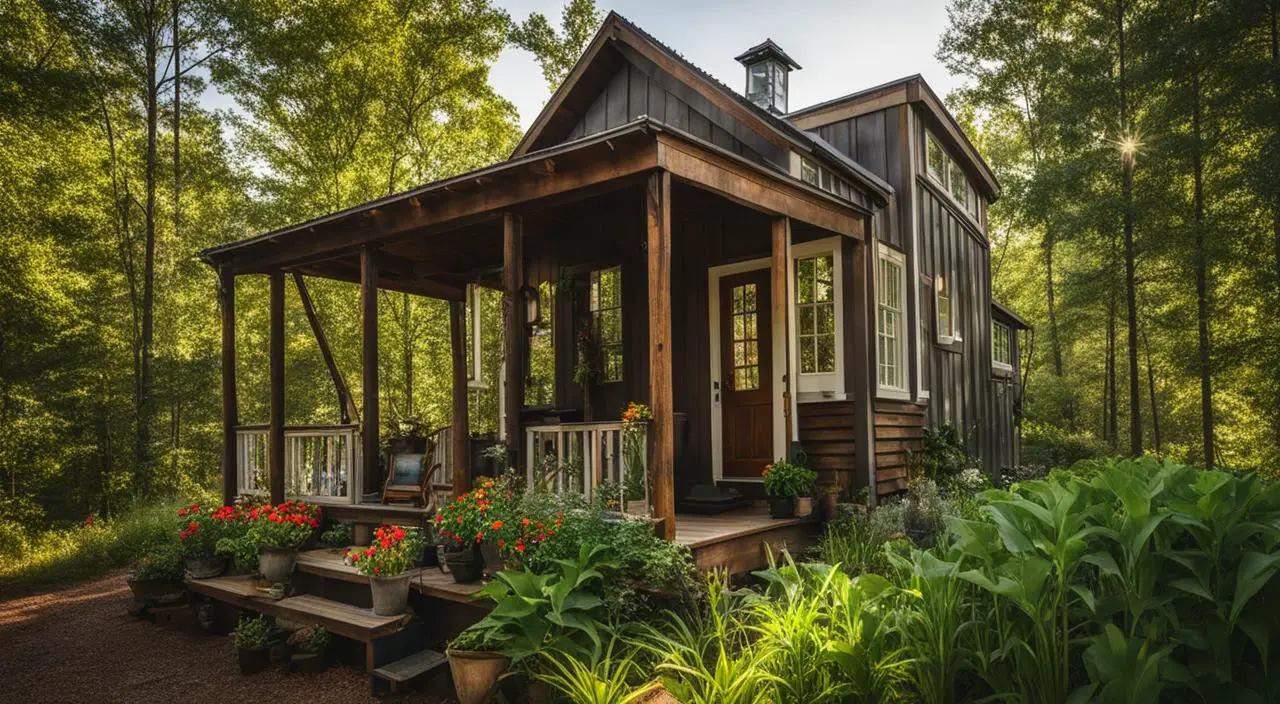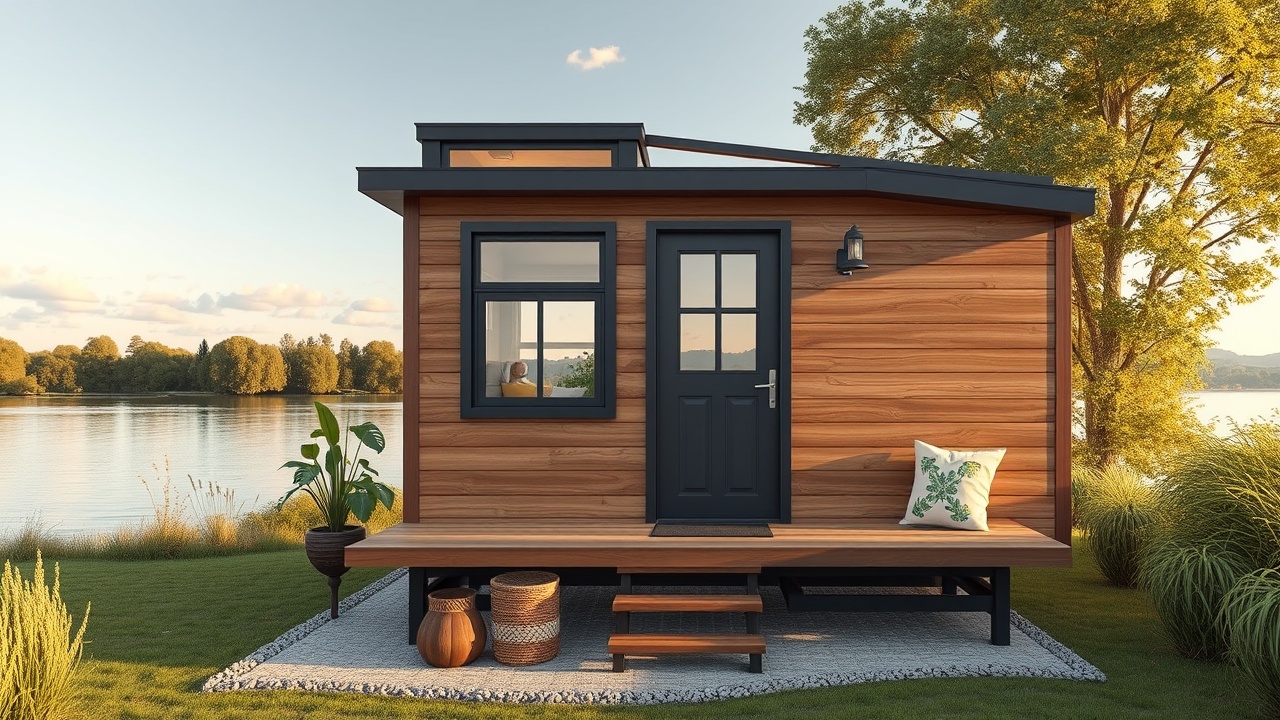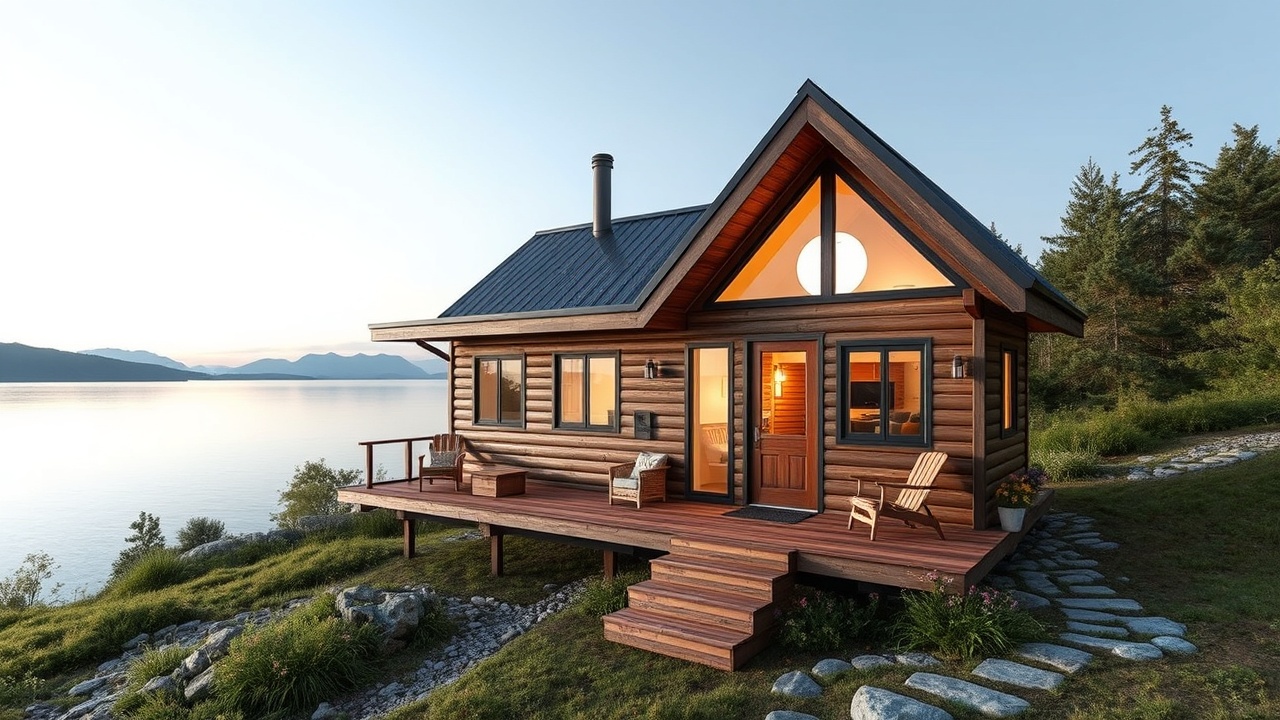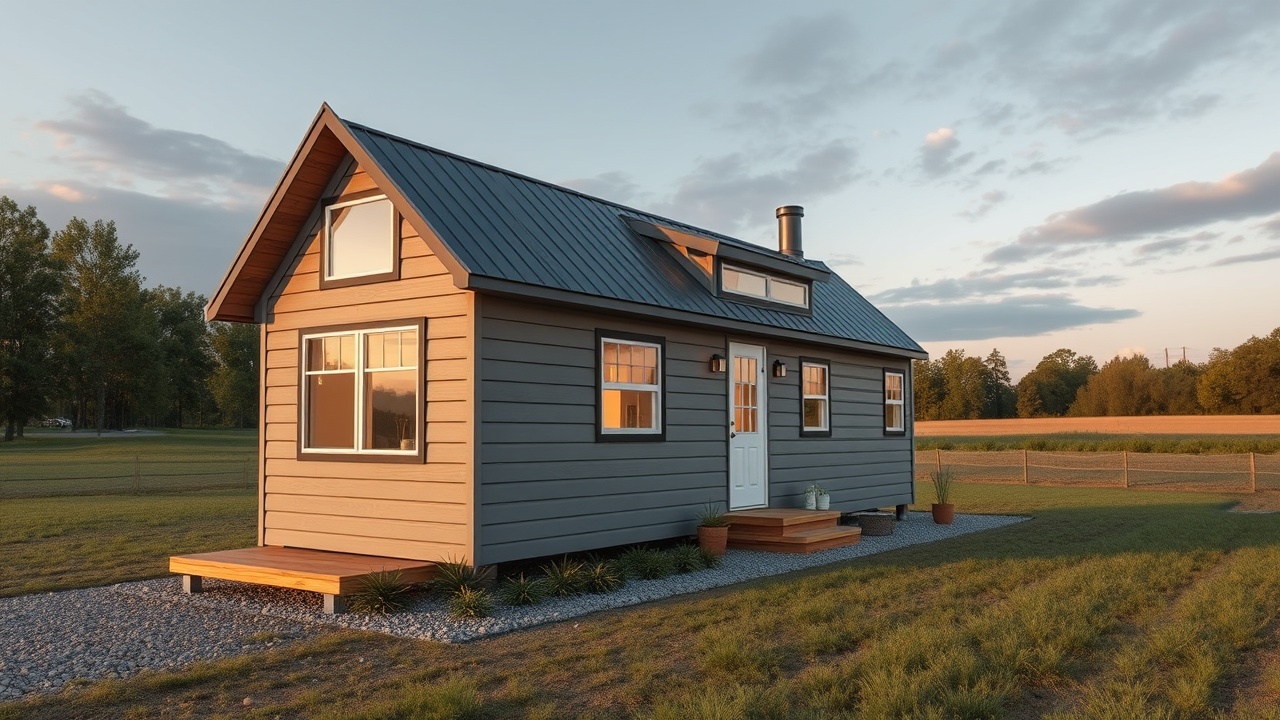Tiny house laws in Georgia: As the tiny house movement gains popularity, it’s important to understand the regulations and codes surrounding tiny houses in your state.
Georgia is no exception, with its own set of laws and regulations governing the construction, placement, and ownership of tiny houses.
Contents
Whether you’re looking to build, buy, or place a tiny house in Georgia, it’s essential to understand the legal requirements to ensure a smooth and legal experience.
This guide will provide a comprehensive overview of Georgia’s tiny house laws and regulations to help you navigate the process.
Understanding Zoning Regulations in Georgia
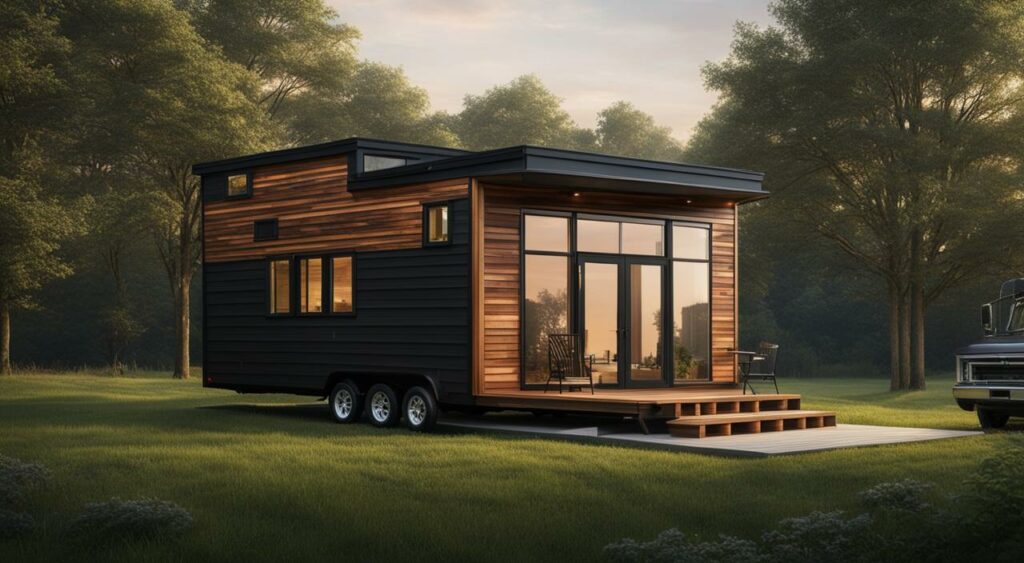
Before building or parking your tiny home in Georgia, it’s important to understand the state’s zoning regulations.
Zoning laws regulate land use, defining where certain types of buildings can be located and what they can be used for.
For tiny house enthusiasts, this means understanding the rules and regulations surrounding small homes in the state.
Georgia state laws on tiny homes differ from local regulations, so it’s important to research both before making any decisions.
Some municipalities in Georgia have specific rules in place for tiny home communities and placement, so be sure to check with your local government for any special rules that may apply.
When looking at zoning regulations in Georgia, it’s important to understand terms like minimum lot size, minimum square footage, and setbacks.
These terms refer to the minimum size of a lot required for a building, the minimum square footage a building must have, and the minimum distance the building must be set back from the property line.
For example, in the city of Atlanta, the minimum lot size for a single-family home is 7,500 square feet, which may not be conducive to parking a tiny house.
However, some counties in Georgia allow for smaller minimum lot sizes and square footage requirements, making them more favorable for tiny house enthusiasts.
Local Regulations for Tiny Homes in Georgia
Each municipality in Georgia has its own unique system of zoning regulations, so it’s essential to research the local laws for your specific area.
It’s also important to look into the requirements for obtaining permits and zoning changes for your tiny house project.
For instance, in the city of Savannah, tiny homes must meet the same building codes and regulations as traditional homes, including obtaining a building permit and undergoing inspections by city officials.
Additionally, the city requires that tiny homes be connected to water and sewer systems and meet the minimum square footage requirements for single-family dwellings.
Tiny House Communities in Georgia
Tiny house communities have been growing in popularity across the country, and Georgia is no exception.
These communities offer a unique opportunity for like-minded individuals to live in a sustainable, minimalist way.
However, as with any housing development, tiny house communities must adhere to local zoning regulations.
In Georgia, some municipalities have specific rules in place for tiny house communities, such as minimum square footage requirements, setbacks, and access to utilities.
It’s important to research these regulations before investing in a tiny house community, as they can impact the overall cost and feasibility of the project.
Understanding the zoning regulations for tiny houses in Georgia is crucial in ensuring a smooth and legal building experience. It’s important to research both state and local laws, as well as any special rules for tiny house communities.
Minimum Size Requirements for Tiny Houses in Georgia
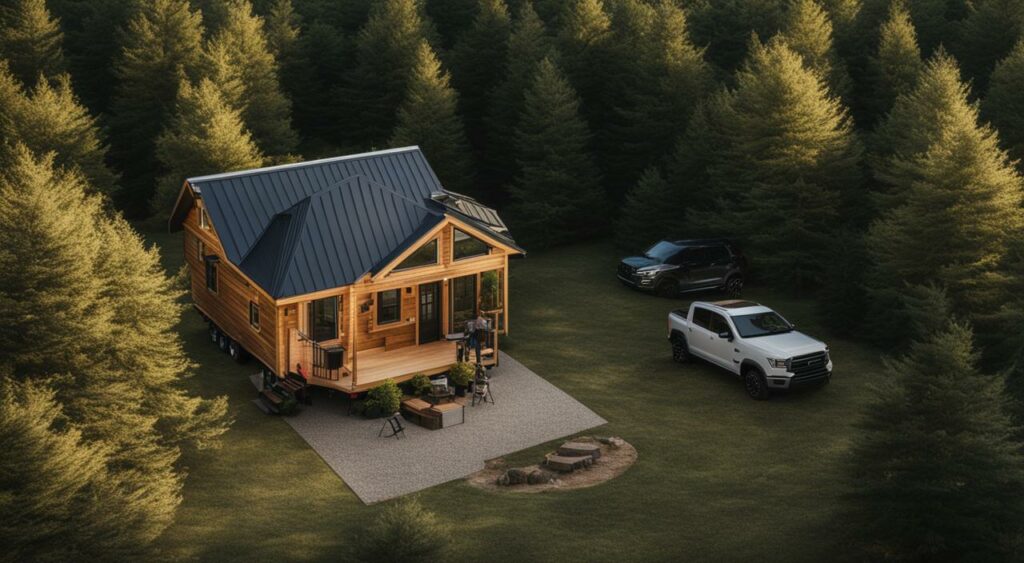
When it comes to building tiny houses in Georgia, there are minimum size requirements that must be met.
These requirements vary depending on the local laws in different counties.
In some counties, such as Fulton County, the minimum size allowed for a tiny house is 400 square feet.
Other counties, such as Clarke County, allow for smaller minimum sizes of 150 square feet.
It’s important to check with the local laws in the county where you plan to build your tiny house to ensure that you are meeting the minimum size requirements.
It’s also worth noting that some local laws may not have minimum size requirements, but instead have limits on the number of square feet a house can be under certain circumstances.
For example, in Atlanta, tiny houses built on a foundation are permitted as long as they are no larger than 750 square feet.
Overall, the minimum size requirements for tiny houses in Georgia are set by the local laws in each county.
While some counties may allow for smaller minimum sizes, others may have stricter requirements.
It’s important to do your research and make sure you are complying with the minimum size requirements in your area.
Obtaining Permits and Building Codes for Tiny Houses in Georgia
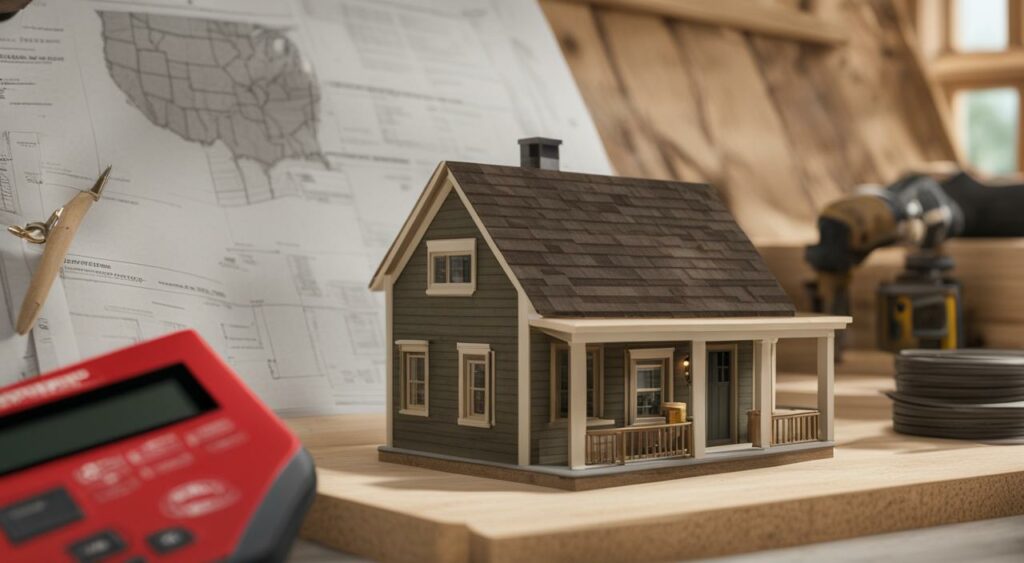
Building and zoning regulations are crucial aspects of constructing and placing a tiny house in Georgia.
Understanding the legal regulations, permits, and building codes can help ensure a hassle-free and lawful experience.
When it comes to building a tiny house in Georgia, there are certain rules and regulations one must adhere to.
These rules vary depending on the location and size of the house.
Georgia state law requires a minimum square footage of 120 square feet for a tiny house, while some counties allow smaller sizes.
Building Codes for Tiny Houses in Georgia
Building codes provide a set of standards that must be followed during the construction process.
Since tiny houses don’t have a separate code, Georgia requires tiny houses to follow the International Residential Code (IRC) 2018 edition.
The IRC outlines the minimum requirements for safety, health, and welfare of the occupants of a residence.
The IRC 2018 edition stipulates that tiny houses must have an egress window, which provides a designated exit route in case of emergencies.
They also require a minimum ceiling height of 6’8″ and a minimum width of at least 8’6″.
Permitting Process for Tiny Houses in Georgia
Before building a tiny house in Georgia, it is essential to obtain the necessary permits. A building permit is required for constructing any permanent structure, including a tiny house.
The permit process may vary depending on the county in which you intend to build the tiny house. Some counties may require additional permits and inspections, such as electrical and plumbing permits.
It is essential to check with the local county officials to determine the specific requirements for the county in which you plan to build.
Ordinances and Zoning Laws for Tiny Houses in Georgia
Georgia’s zoning regulations play a crucial role in determining where and how a tiny house can be placed.
Each county has its own zoning laws and ordinances, which determine the use, placement, and size of homes in the area.
Some local governments have specific zoning laws for tiny houses, while others permit tiny houses under the same regulations as single-family homes.
However, in most cases, tiny houses may not be used as permanent residences in urban areas due to zoning restrictions.
In conclusion, Georgia’s tiny house legal regulations require adherence to building codes, permitting processes, and zoning laws specific to the location.
These regulations ensure the safety and welfare of the occupants while providing a coherent standard for construction and placement of tiny houses.
Can You Put a Tiny House on Your Property in Georgia?
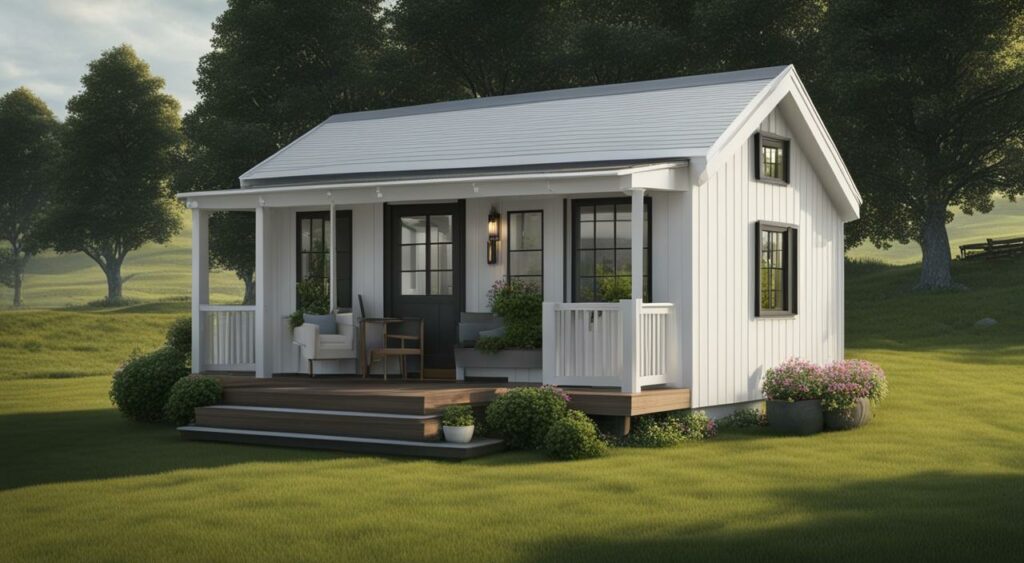
One of the most common questions people have when considering a tiny house in Georgia is whether they can put one on their own property.
The answer, as with most legal questions, is that it depends on a few factors.
Are Tiny Homes Allowed in Georgia?
Yes, tiny homes are allowed in Georgia, but there are restrictions and limitations that must be followed.
To understand whether you can put a tiny house on your property, it’s important to first consider the legal status of tiny homes in the state.
According to Georgia law, a tiny house is considered a dwelling that is 400 square feet or less in floor area excluding lofts.
As long as the tiny house meets the minimum square footage requirements and complies with local and state regulations, it can be placed on private property for use as a permanent residence, temporary residence, or vacation home.
Are Tiny Houses Legal in Georgia?
Yes, tiny houses are legal in Georgia as long as they comply with specific regulations and codes.
These regulations can vary depending on the location, so it’s important to research and understand the rules within your county or city.
Can You Put a Tiny House on Your Property in Georgia?
Yes, you can put a tiny house on your property in Georgia, but there are some important considerations to keep in mind.
Here are a few key points:
- Check local zoning laws: Before placing a tiny house on your property, you’ll need to check local zoning laws to ensure that it’s allowed in your area. Some areas may not permit tiny houses on private property, or there may be specific regulations that must be followed.
- Obtain necessary permits: If tiny houses are permitted in your area, you may need to obtain various permits for construction, plumbing, electrical, or other requirements. Check with your local building department to ensure you have the necessary permits before constructing your tiny home.
- Meet minimum requirements: As mentioned earlier, Georgia law requires that tiny homes be at least 400 square feet in size. Make sure your tiny house complies with these minimum requirements and other relevant codes and regulations.
- Comply with land use regulations: Depending on the location and intended use of your tiny house, there may be additional land use regulations that must be followed. For example, if your tiny house will be used as a vacation home or temporary residence, there may be limitations on the length of stay or the number of occupants.
By understanding the regulations and requirements surrounding tiny houses in Georgia, you can determine whether placing a tiny house on your property is a viable option.
Remember to research local laws, obtain necessary permits, and ensure compliance with all relevant regulations to avoid any legal issues down the line.
Buying a Tiny House in Georgia: Legal Requirements
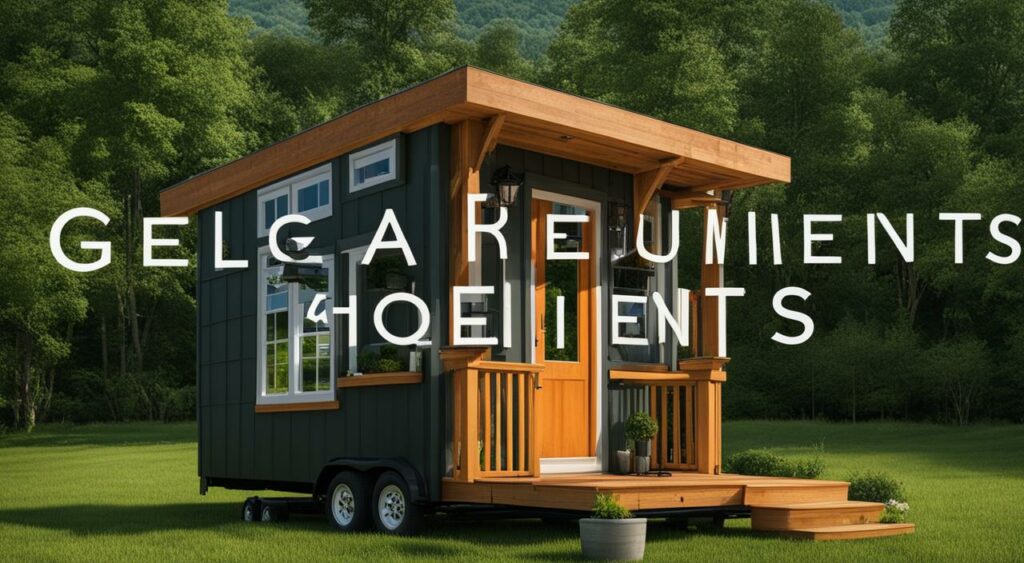
Buying a tiny house in Georgia requires knowledge of the state’s legal requirements.
To ensure a smooth and legal purchasing experience, potential buyers need to be aware of the regulations and codes that govern tiny houses in Georgia.
Firstly, it’s important to note that tiny homes are legal in Georgia, but there are specific requirements that need to be met.
The Georgia Department of Community Affairs oversees the state’s building codes, and tiny homes are subject to the same regulations as traditional homes.
According to Georgia’s building codes, a tiny house must have at least one room that measures at least 120 square feet, and all other habitable rooms must be at least 70 square feet.
The ceiling height must be at least 7 feet, and the house must have a functional kitchen and bathroom.
It’s also important to note that tiny houses on wheels are considered recreational vehicles (RVs) in Georgia and are subject to additional regulations.
According to Georgia state law, an RV can only be occupied for 180 days per year, and the owner must have a permanent residence elsewhere.
Potential buyers should also be aware of the specific zoning regulations and building codes in the county where they plan to place their tiny house.
Some counties have specific requirements that differ from the state’s regulations, such as minimum square footage or specific materials that must be used.
To ensure compliance with all legal requirements, it’s important to work with a licensed contractor who is familiar with Georgia’s tiny house regulations.
They can help with obtaining necessary permits and ensure that the construction of the tiny house meets all legal requirements.
“Buying a tiny house in Georgia requires knowledge of the state’s legal requirements. To ensure a smooth and legal purchasing experience, potential buyers need to be aware of the regulations and codes that govern tiny houses in Georgia.”
Zoning Laws for Tiny House Communities in Georgia
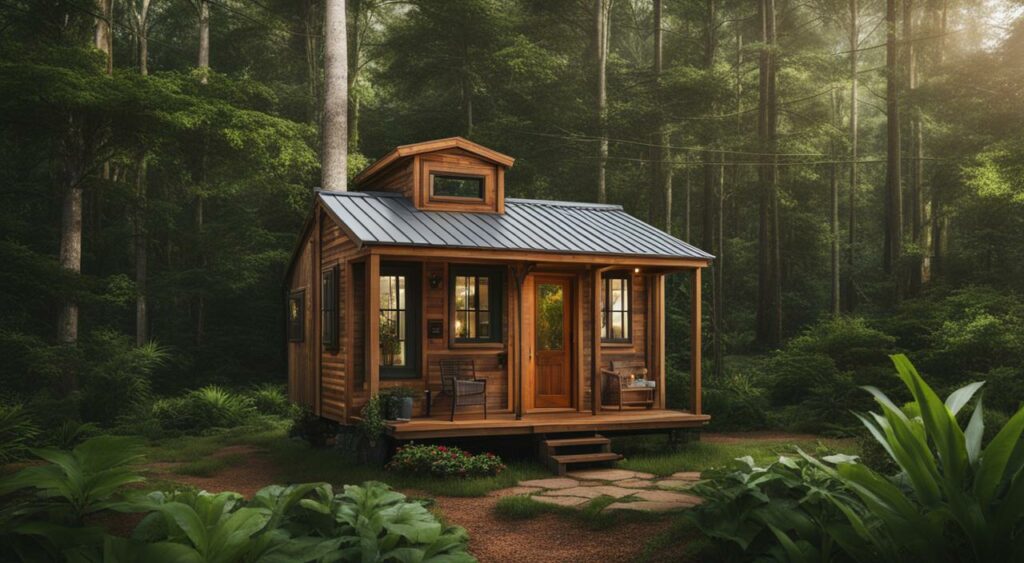
When it comes to building a tiny house in Georgia, understanding the zoning laws is crucial.
While the regulations vary by location, there are some general rules and guidelines that all tiny house enthusiasts should be aware of.
Permits for Tiny Houses in Georgia
Before beginning any construction, it is important to obtain the necessary permits. In Georgia, building permits for tiny houses are typically issued at the local level.
This means checking with your county or city government to determine the specific requirements for your location.
Building Codes for Tiny Houses in Georgia
In addition to permits, it’s also important to understand the building codes for tiny houses in Georgia.
While some counties may allow for more lenient codes, many follow the International Residential Code (IRC) for tiny houses.
The IRC sets standards for things like ceiling height, stairways, and emergency exits. It’s important to ensure your tiny house meets these requirements to avoid any legal issues in the future.
Georgia Tiny House Community Regulations
For those interested in living in a tiny house community, it’s important to understand the regulations in the specific area.
There are currently no statewide regulations for tiny house communities in Georgia, so it’s important to research and understand the local laws. This may include zoning, land use, and permitting regulations.
Land Use Regulations for Tiny Houses in Georgia
When it comes to placing your tiny house, it’s important to understand the land use regulations in your specific location.
While some areas may allow for tiny houses to be placed on private property, others may require them to be in designated communities or RV parks.
It is important to research and understand these regulations to avoid any legal issues in the future.
Georgia Tiny House Building Permits
When applying for building permits for a tiny house in Georgia, it’s important to provide detailed plans and specifications.
This may include details such as the square footage, layout, and materials used.
It’s important to ensure that your plans comply with both local zoning laws and any applicable building codes.
Tiny Home Rules in Georgia
While there are no specific laws for tiny homes in Georgia, it is important to understand the legal requirements for building and living in one.
This includes obtaining the necessary permits, following building codes, and complying with any local zoning laws.
It’s also important to ensure that your tiny home meets safety standards and has proper utilities.
Overall, understanding the zoning laws for tiny houses in Georgia is essential for anyone interested in building or living in one.
From obtaining permits to complying with building codes, there are many factors to consider.
Taking the time to research and understand these regulations can help ensure a smooth and legal experience for all tiny house enthusiasts.
Restrictions and Limitations on Tiny House Placements in Georgia
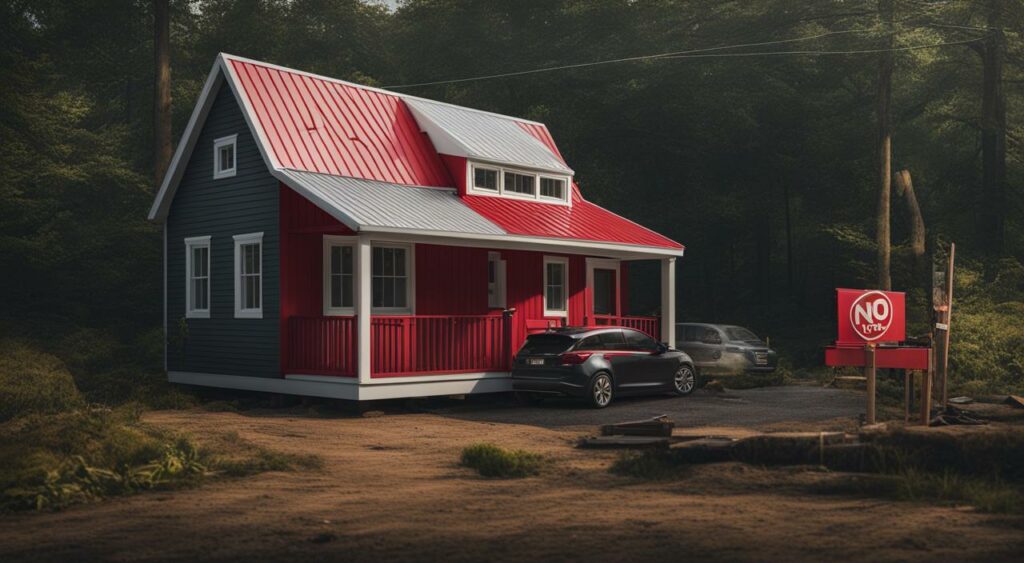
Before investing in a tiny house in Georgia, it is crucial to understand the restrictions and limitations on where you can place it.
Zoning regulations for tiny houses in Georgia can vary depending on the location and can determine if a tiny house can be placed on private property or in a community.
Georgia zoning regulations for tiny houses may require a certain minimum square footage, and some counties may not allow tiny houses at all.
It is important to research local zoning laws and permits to ensure that the placement of a tiny house is legal. Additionally, there may be specific regulations for tiny house communities in Georgia.
For example, there may be regulations on land use and building codes that must be followed in order to create a legal tiny house community.
In Georgia, tiny house living is still relatively new, so it is important to stay up-to-date on any new regulations or zoning laws that may be implemented.
Doing so can help ensure a smooth and legal experience for tiny house enthusiasts.
“It is important to research local zoning laws and permits to ensure that the placement of a tiny house is legal.”
Understanding Tiny House Legislation in Georgia
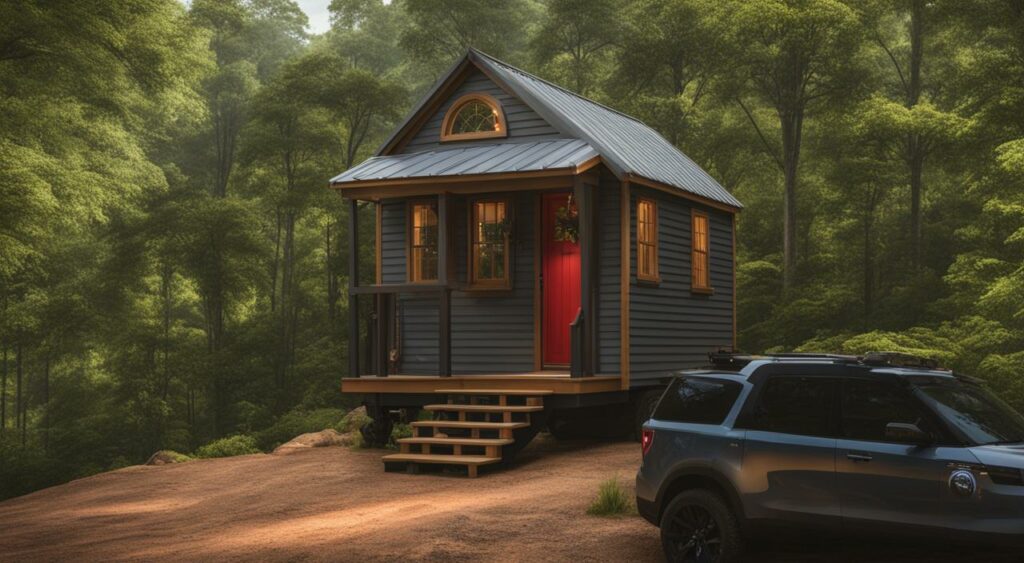
As the tiny house movement gains momentum in Georgia, it is essential to understand the legislation surrounding these dwellings.
From RV laws to zoning regulations, there are several legal requirements that tiny house enthusiasts must adhere to.
Georgia’s RV Laws for Tiny Houses
Recreational vehicles (RVs) are a popular housing option for tiny house enthusiasts, but it is important to know the laws surrounding their use in Georgia.
According to Georgia law, to be considered an RV, a vehicle must be self-propelled and fully equipped for living.
Additionally, RVs must be registered with the state and obtain a license plate.
The Permitting Process for Tiny Houses in Georgia
Obtaining the proper permits for tiny house construction in Georgia can be a complex process. Building permits are typically required for any new construction, including tiny houses.
However, certain counties may have additional requirements or restrictions for tiny homes. It is important to research local regulations and obtain all necessary permits before beginning construction.
Georgia Zoning Laws for Tiny Homes
Zoning regulations are a crucial consideration when it comes to building and placing tiny homes in Georgia. Each county may have its own specific zoning ordinances regarding tiny houses.
For example, some counties may not allow tiny houses to be used as primary residences or may have minimum square footage requirements.
It is important to thoroughly research local zoning laws before choosing a location for a tiny house.
Georgia Tiny House Communities
There are several tiny house communities throughout Georgia that are designed specifically for tiny home living.
These communities may have their own set of rules and regulations regarding tiny house construction and placement.
It is important to research and understand these regulations before purchasing or building a tiny home in a community.
Laws on Living in a Tiny House in Georgia
Living in a tiny house full-time in Georgia can present unique legal challenges.
For example, some counties may require tiny houses to be connected to a sewage system, while others may allow for composting toilets.
It is important to understand the legal requirements for living in a tiny house, including rules around utilities, waste disposal, and more.
Georgia Tiny Home Ordinances
Each county in Georgia may have its own set of ordinances regarding tiny homes, including building codes, restrictions on placement, and more.
It is important to research and understand these ordinances before purchasing or building a tiny home in Georgia.
Failure to comply with these regulations can result in fines or legal action.
Overall, understanding the legislation surrounding tiny homes in Georgia is essential for anyone considering this housing option.
From RV laws to zoning regulations and beyond, there are numerous legal considerations that must be taken into account.
Georgia’s Tiny House Regulations: What You Need to Know
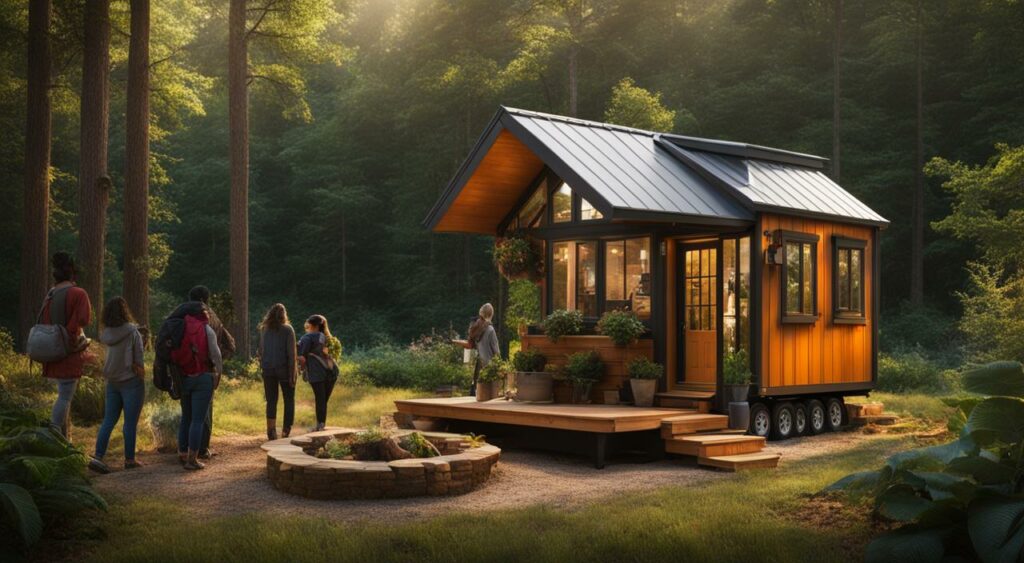
Georgia has specific laws and regulations that govern the construction, placement, and living arrangements of tiny houses.
It is essential to have a good understanding of these laws and regulations before embarking on any tiny house project in the state.
This section will provide a consolidated view of all the important information you need to know about Georgia’s tiny house regulations.
Georgia Laws for Tiny Homes
Georgia has specific laws for tiny homes that include zoning and building regulations, minimum square footage requirements, and other related laws.
Tiny homes in Georgia are considered to be structures that are less than 400 square feet and are built on a trailer or foundation.
Georgia Tiny House Building Codes
Building codes for tiny houses in Georgia vary depending on the location and size of the house.
Georgia has adopted the International Residential Code (IRC) for all new construction, including tiny houses.
The code regulates aspects such as the minimum size of rooms, ceiling height, and stairways, among other requirements.
Zoning Laws for Tiny Homes in Georgia
Zoning regulations for tiny homes in Georgia vary depending on the location.
Some cities and counties have specific rules and regulations that govern the placement and construction of tiny houses.
It is important to check with local authorities before starting any tiny house project.
Permits for Tiny House Construction in Georgia
Permits for tiny house construction in Georgia vary depending on the location and the size of the house.
Some cities and counties require building permits for all new construction, while others only require permits for houses over a certain size.
It is important to check with local authorities to determine the necessary permits for your tiny house project.
Minimum Square Footage for Tiny Houses in Georgia
Georgia has minimum square footage requirements for tiny houses, which vary depending on the location.
For example, Atlanta requires tiny houses to be at least 750 square feet, while other cities may allow houses as small as 150 square feet.
It is important to check with local authorities to determine the minimum square footage requirements for your tiny house project.
Georgia Tiny House Living Regulations
Georgia has specific regulations that govern living in a tiny house, including requirements for utilities, sewage systems, and other essential services.
It is important to ensure that your tiny house meets all these regulations before occupying it.
Limitations on Tiny House Placements in Georgia
Georgia has specific limitations on where tiny houses can be placed, depending on the location.
Some cities and counties require tiny houses to be placed on designated lots, while others allow them to be placed on private property.
It is important to check with local authorities to determine the limitations on tiny house placements in your area.
Georgia Tiny House Building Restrictions
Georgia has specific building restrictions for tiny houses, which vary depending on the location and the size of the house.
Some cities and counties have specific regulations that govern the materials used in construction, the type of foundation, and other related aspects.
It is important to check with local authorities before starting any tiny house project.
Georgia Small House Laws
Georgia does not have specific laws for small houses, but they are subject to the same regulations as tiny houses.
Small houses are typically larger than tiny houses but still smaller than traditional homes.
Georgia Laws on Tiny Houses
Georgia has specific laws that govern tiny houses, including zoning, building regulations, and living arrangements.
It is important to have a good understanding of these laws before starting any tiny house project in the state.
Georgia Tiny House Permits
Georgia requires permits for all new construction, including tiny houses. Permits are typically required for electrical, plumbing, and other related aspects of construction.
It is important to check with local authorities to determine the necessary permits for your tiny house project.
Georgia Tiny House Legislation
Georgia has specific legislation related to tiny houses, including RV laws, permitting processes, living regulations, and other related laws.
It is important to have a good understanding of this legislation before starting any tiny house project in the state.
Georgia Affordable Housing Laws
Georgia has specific affordable housing laws that aim to increase access to housing for low-income families.
Tiny houses can be a cost-effective and efficient way to address affordable housing issues in the state.
It is important to check with local authorities to determine the availability of affordable housing options in your area.
Conclusion
It is evident that there are many regulations and codes surrounding the construction and placement of tiny houses in Georgia.
Understanding these laws is crucial for anyone considering building or living in a tiny house in the state.
Be Informed
From zoning regulations to building codes, it is essential to be informed about the local and state laws that govern tiny houses in Georgia.
Failure to comply with these laws can result in fines, legal battles, and even the removal of the tiny house.
Compliance is Key
It is vital to comply with all tiny house laws and regulations to ensure a safe and legal experience.
Obtaining the necessary permits and adhering to building codes will ensure that the tiny house is constructed to the required standards.
Stay Updated
As tiny house legislation continues to evolve, it is crucial to stay updated on any changes to the laws and regulations.
Keeping track of changes will help avoid any legal repercussions and ensure compliance with all necessary rules.
In conclusion, building or living in a tiny house in Georgia can be an exciting and rewarding experience.
However, it is crucial to understand and comply with all laws and regulations to ensure a smooth and legal process.
By staying informed and up to date with any changes in the legislation, tiny house enthusiasts can enjoy their tiny homes without facing any legal issues.

